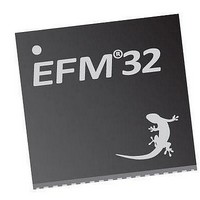EFM32TG210F32 Energy Micro, EFM32TG210F32 Datasheet - Page 454

EFM32TG210F32
Manufacturer Part Number
EFM32TG210F32
Description
MCU 32BIT 32KB FLASH 32-QFN
Manufacturer
Energy Micro
Series
Tiny Geckor
Specifications of EFM32TG210F32
Core Processor
ARM® Cortex-M3™
Core Size
32-Bit
Speed
32MHz
Connectivity
EBI/EMI, I²C, IrDA, SmartCard, SPI, UART/USART
Peripherals
Brown-out Detect/Reset, DMA, POR, PWM, WDT
Number Of I /o
24
Program Memory Size
32KB (32K x 8)
Program Memory Type
FLASH
Ram Size
4K x 8
Voltage - Supply (vcc/vdd)
1.8 V ~ 3.8 V
Data Converters
A/D 4x12b, D/A 1x12b
Oscillator Type
External
Operating Temperature
-40°C ~ 85°C
Package / Case
32-VQFN Exposed Pad
Processor Series
EFM32
Core
ARM Cortex-M3
Data Bus Width
32 bit
Data Ram Size
32 KB
Interface Type
UART, I2C, SPI
Maximum Clock Frequency
32 MHz
Number Of Programmable I/os
17
Number Of Timers
1
Operating Supply Voltage
1.8 V to 3.8 V
Maximum Operating Temperature
+ 85 C
Mounting Style
SMD/SMT
Processor To Be Evaluated
EFM32TG210
Lead Free Status / RoHS Status
Lead free / RoHS Compliant
Eeprom Size
-
Lead Free Status / Rohs Status
Details
- Current page: 454 of 522
- Download datasheet (9Mb)
28.3.6 Output to PRS
28.3.7 Synchronization
2010-12-21 - d0034_Rev0.90
Example 28.1. Interrupt Example
Setting EXTIPSEL3 in GPIO_EXTIPSELL to 2 (Port C) and setting the GPIO_EXTIRISE[3] bit, the
interrupt flag EXT[3] in GPIO_IF will be triggered by a rising edge on pin 3 on PORT C. If EXT[3] in
GPIO_IEN is set as well, a interrupt request will be sent on IRQ_GPIO_ODD.
All pins with the same pin number (n) are grouped together to form one PRS producer output, giving
a total of 16 outputs to the PRS. The port on which the output n should be taken is selected by the
EXTIPSELn[3:0] bits in the GPIO_EXTIPSELL or the GPIO_EXTIPSELH registers.
To avoid metastability in synchronous logic connected to the pins, all inputs are synchronized with
double flip-flops. The flip-flops for the input data run on the HFCORECLK. Consequently, when a
pin changes state, the change will have propagated to GPIO_Px_DIN after 2 positive HFCORECLK
edges, or maximum 2 HFCORECLK cycles. Synchronization (also running on the HFCORECLK) is also
added for interrupt input. The input to the PRS generation is also synchronized, but these flip-flops
run on the HFPERCLK. To save power when the external interrupts or PRS generation is not used,
the synchronization flip-flops for these can be turned off by clearing the INTSENSE or PRSSENSE,
respectively, in GPIO_INSENSE register.
Note
To use the GPIO, the GPIO clock must first be enabled in CMU_HFPERCLKEN0. Setting
this bit enables the HFCORECLK and the HFPERCLK for the GPIO. HFCORECLK is used
for updating registers, while HFPERCLK is only used to synchronize PRS and interrupts.
The PRS and interrupt synchronization can also be disabled through GPIO_INSENSE, if
these are not used.
...the world's most energy friendly microcontrollers
454
www.energymicro.com
Related parts for EFM32TG210F32
Image
Part Number
Description
Manufacturer
Datasheet
Request
R

Part Number:
Description:
KIT STARTER EFM32 GECKO
Manufacturer:
Energy Micro
Datasheet:

Part Number:
Description:
KIT DEV EFM32 GECKO LCD SUPPORT
Manufacturer:
Energy Micro
Datasheet:

Part Number:
Description:
BOARD PROTOTYPING FOR EFM32
Manufacturer:
Energy Micro
Datasheet:

Part Number:
Description:
KIT DEVELOPMENT EFM32 GECKO
Manufacturer:
Energy Micro
Datasheet:

Part Number:
Description:
MCU, MPU & DSP Development Tools TG840 Sample Kit
Manufacturer:
Energy Micro
Datasheet:

Part Number:
Description:
MCU, MPU & DSP Development Tools TG Starter Kit
Manufacturer:
Energy Micro
Datasheet:

Part Number:
Description:
MCU, MPU & DSP Development Tools TG108 Sample Kit
Manufacturer:
Energy Micro

Part Number:
Description:
MCU, MPU & DSP Development Tools TG210 Sample Kit
Manufacturer:
Energy Micro
Datasheet:

Part Number:
Description:
MCU, MPU & DSP Development Tools TG822 Sample Kit
Manufacturer:
Energy Micro
Datasheet:

Part Number:
Description:
MCU, MPU & DSP Development Tools TG230 Sample Kit
Manufacturer:
Energy Micro

Part Number:
Description:
SAMPLE KIT (SMALL BOX - CONTAINING 2 DEVICES)
Manufacturer:
Energy Micro

Part Number:
Description:
SAMPLE KIT (SMALL BOX - CONTAINING 2 DEVICES)
Manufacturer:
Energy Micro










